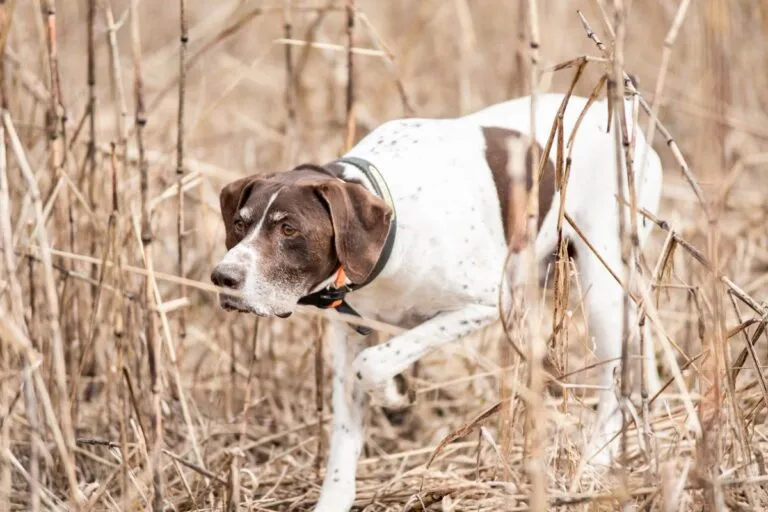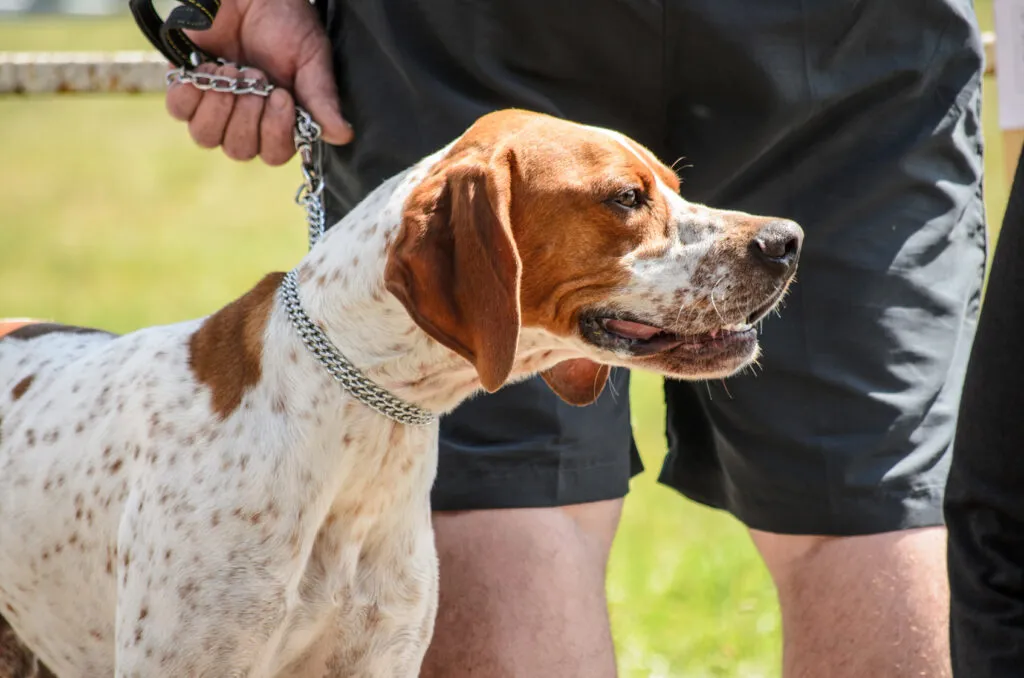Medium Size Poodle
This attractive and intelligent four-legged friend is appreciated by many animal lovers around the world. Due to its qualities as a hunting dog—especially on fields—the English Pointer is a demanding companion, best suited to experienced dog owners who share its greatest passion: hunting.

© Jordan / stock.adobe.com
The pointer bears its name because its body points in the direction of the prey when hunting
The English Pointer visually exudes its hunting passion: At first glance, the harmonious body proportions stand out. It is a sinewy and elegant dog that combines power and grace. Pointer enthusiasts rave about the aesthetics of this dog, which moves elegantly and enduringly through forest and field.
The dynamic build hints at its Greyhound heritage, as Greyhounds are among the Pointer’s ancestors. When tracking, the Pointer noticeably holds its nose high.
The short-haired fur comes in combinations of white-lemon yellow, white-liver brown, white-black, tri-coloured and also solid brown or black.
In all colour variations, the coat should be smooth and shiny. Males can reach a shoulder height of up to 69cm, while females are slightly smaller. Pointers weigh between 25kg and 30kg.
Even though this dog is today seen as a typically British hunting dog, its ancestors likely came from Spain. They eventually reached Britain with British soldiers. The ancestors of the Pointer, including the speedy Greyhounds, Foxhounds, and French hunting dogs, contributed to making the Pointer the attractive and efficient hunter it is today.
The Pointer is considered a pioneer among pointing dogs, characterised by standing still when it successfully spots game. This trait likely emerged as a spontaneous mutation in some dogs, which were then selectively bred. The Pointer is particularly used for hunting wild birds like pheasants.
The name ‘Pointer’ derives from the Spanish perro de punta, meaning “pointing dog”.
A well-exercised English Pointer is a thoroughly pleasant and intelligent dog. It is very loyal to its pack and friendly to both humans and other animals. Life with children or cats is generally very harmonious. The hunter should already have met cats and other pets at the breeder’s.
This sensitive dog appreciates cuddle time with its loved ones after adventures in forest and field. A hunting English Pointer can therefore integrate well into family life. Pointers are not very territorial and due to their friendly nature, they are not particularly suited as guard dogs.
This dog likes to follow your wishes, without being submissive. Naturally, these dogs should live directly in the house and definitely not be kept in a kennel.
 © Morev_N / stock.adobe.com
© Morev_N / stock.adobe.com
In general, the sensitive Pointer is easy to train with gentle, consistent training. It is naturally obedient and intelligent, so it quickly understands what you expect from it. However, even well-trained Pointers find it difficult to follow commands in the middle of a hunt. The Pointer can sometimes be hard to recall.
Don’t expect the impossible from your Pointer and proceed with great understanding in training: Be consistently firm, but without trying to dominate your companion. This dog enjoys carrying out your commands but wants to be treated as a partner.
Keep in mind that successful training only bears fruit if the dog can fulfil its hunting instinct or is otherwise intensively occupied. A hunter without enough activity will always be “hard to train” and will seek other ways to use its excess energy.
Ideally, this dog undergoes professional hunting dog training. When looking for suitable trainers, ensure that positive motivation is emphasised. Consistency and positive reinforcement are key to successful Pointer training.
You might have guessed it: The primary activity this dog loves is hunting—it was bred for this purpose over centuries. Without the opportunity to fulfil this need, the Pointer is challenging to keep appropriately.
For some, you can channel this sporty dog’s great work ethic into other activities. Nose-work activities like dog sports such as mantrailing or training as a rescue dog might be interesting alternatives.
A Pointer should enjoy extensive exercise daily, regardless of the weather. A fully grown dog of this breed makes an excellent companion for jogging, cycling, or horseback riding.
Ideally, these active pets also have the chance to romp around in a fenced garden, especially since an off-leash run isn’t feasible for every English Pointer.
English Pointers are robust dogs that can live up to 14 years. If you choose a Pointer from a reputable breeder, you are likely to have a dog with the best chances for a long and healthy life.
It’s advisable to discuss the breeder’s healthcare measures—what diseases have the parent animals been tested for? It’s always a good idea to evaluate the parents’ hips, as hip dysplasia can occur in English Pointers.
Despite being hardy hunters, they can occasionally be sensitive to cold and moisture and might catch chills easily. Make sure to dry your dog thoroughly after an outing in the rain.
 © liramaigums / stock.adobe.com
© liramaigums / stock.adobe.com
Proper feeding is crucial for a healthy dog life. Like all other dog breeds, Pointers require protein-rich animal food with meat as the main ingredient—whether you choose wet or dry food. Ensure meat is the first ingredient on the list and avoid foods containing grain.
The dog’s energy needs are closely linked to its activity level, and recommended daily rations on packaging are only guidelines. Pointers not involved in hunting or dog sports tend to gain weight quickly. Keep an eye on your dog’s waistline and adjust its diet accordingly if it gains or loses weight.
It’s important to let the dog rest after meals to prevent potentially deadly gastric torsion. An adult Pointer should have its daily food requirement divided into at least two meals. Treats like dried chew items or dental care snacks are suitable. Ensure your companion always has access to fresh drinking water.
The short coat of the English Pointer is easy to care for. Brush your dog twice a week with a soft brush to remove loose hairs—this also means fewer hairs around your house. Bathe your dog only when absolutely necessary and when dirt cannot be brushed out once dry.
Always use a mild dog shampoo and ensure your dog doesn’t catch a chill afterward. Check the floppy ears regularly and clean them when needed with an ear cleaner to prevent infections.
Generally, a Pointer’s claws are naturally worn down with its high activity levels, so claw clipping is usually unnecessary. Only older dogs may sometimes need nail keratin shortening to avoid snagging and injury.
This nature-loving dog doesn’t belong in an urban apartment and, as a passionate hunting dog, is best suited to a hunter. Even among hunters, not everyone is suited to handle a Pointer, as it’s specifically bred for open-field hunting.
The breed is best for experts who can effectively manage its incredible speed and independence.
Therefore, a Pointer isn’t suitable for sedentary people or beginners. A Pointer trained as a hunting dog can be an excellent family pet, often getting along well with children. These should be taught to respect animals from a young age, ensuring a lifelong friendship!
If it will live with cats or small animals, ideally, the Pointer should have been exposed to them as a puppy, to quickly accept them as pack members. However, never leave it alone with small animals. It is highly beneficial if your Pointer has secured space like a well-fenced garden to run and sniff to its heart’s content.
Due to its hunting instinct, it’s not always possible to walk every Pointer off-lead. If you’re unsure whether a hunting dog is the right companion for you, consider other dog breeds.
Consider that by buying an English Pointer, you take responsibility for your new companion for many years. This commitment involves considerable time and money in the coming years. Beyond basic supplies, regular vet visits are necessary; you also need to account for high-quality food, liability insurance, and dog tax.
Besides, you should have enough savings for your dog’s health emergencies. Plan what to do if you’re ill or on holiday without your dog. A high-energy dog like a Pointer may need specific arrangements, as finding suitable holiday care might be trickier compared to a small companion dog.
Think ahead about good care options. Consider the daily time you’ll need to spend outdoors with your dog from its arrival: a Pointer needs at least two hours of exercise, whether through walks or hunts, per day.
Buy a Pointer only from a registered Pointer breeder. Even among them, there may be less reputable ones. Ensure you visit the puppies at their original home and meet the parent dogs.
Do they all appear balanced and healthy? Puppies move to new homes no earlier than eight weeks old, dewormed and vaccinated—remember the follow-up vaccinations—and with a pet passport. Discuss the breeding goals and the use of English Pointers with potential breeders.
It’s a good sign if the breeder asks you critical questions—it shows they care about their dogs’ well-being. Pointers are relatively rare, meaning you may have to travel long distances and/or wait to get a Pointer puppy. But the wait is worth it if you get your new housemate from an experienced breeder.
If you wish to adopt an adult Pointer, look online, especially at specific Pointer organisations, and contact them. They specialise in rehoming Pointers and Pointer mixes needing new homes. Some mixes from abroad looking for homes can make wonderful companions. Thoroughly investigate the dog’s character and match it with your dog experience.
We wish you a wonderful time with your English Pointer!
Fans of the Bearded Collie agree that those who aren't familiar with this dog breed simply have to get acquainted with it. And those who have experienced how a Bearded Collie bolts across meadows with its flowing fur, how it rolls around full of energy and joy and how it attentively and observantly takes into account its owners wishes become simply addicted to this original dog breed and its unique charm.
The Goldendoodle isn't a breed, but a pairing between Golden Retrievers and Medium or Standard Poodles. Marketed as a low-maintenance dog for allergy sufferers, this hybrid is enjoying increasing popularity amongst dog lovers, similar to the Labradoodle.